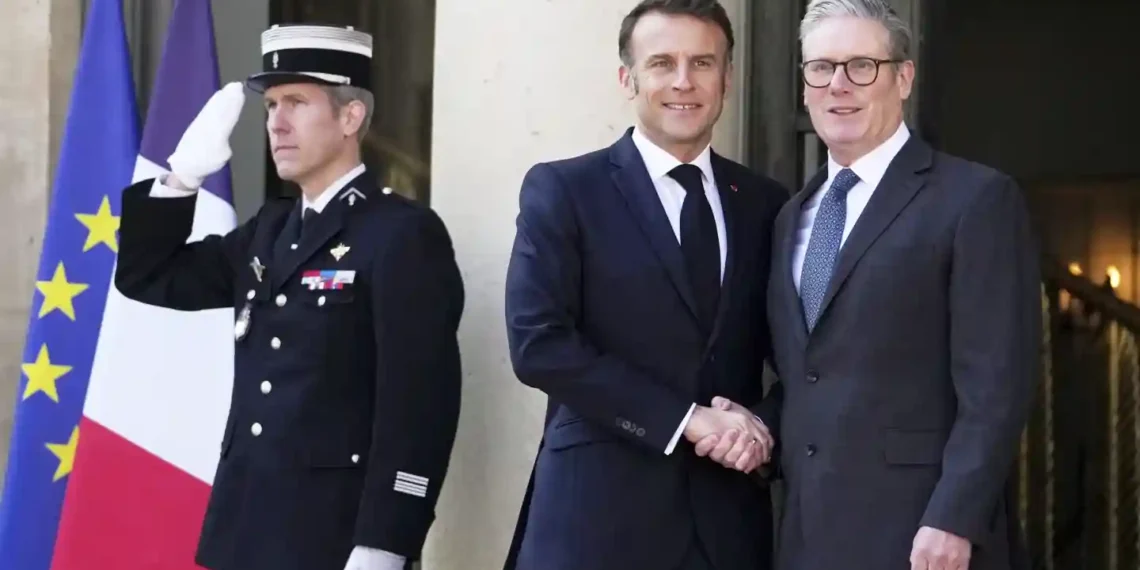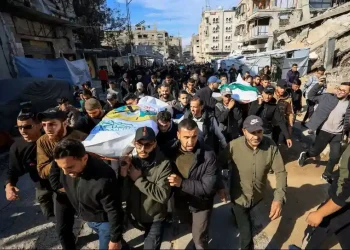France Pushes Forward with Military Deployment in Ukraine Despite European Divide
French President Emmanuel Macron reaffirmed that France and Britain will move ahead with plans to deploy troops in Ukraine to secure a future peace deal with Russia, despite resistance from some European allies. Speaking after a high-level summit, Macron acknowledged that while “several” nations expressed interest in joining the initiative, “it is not unanimous.”
The proposed force aims to act as a deterrent, preventing Russia from violating any future peace agreement. “We do not need unanimity to achieve it,” Macron emphasized, adding that French and British military officials would collaborate with Ukraine to determine the scope and positioning of the force.
“There will be a reassurance force with several European nations that will deploy,” he stated firmly.
The summit, attended by leaders from nearly 30 countries, as well as NATO and EU officials, comes at a critical moment in the three-year war. Diplomatic efforts, largely spurred by U.S. President Donald Trump, have gained momentum, but intense fighting continues.
Hours before the summit, Russian drone strikes injured over 20 people, while heavy shelling in Kherson killed one person and caused widespread power outages, according to Ukrainian officials.
Macron and other leaders accused Russia of feigning interest in peace negotiations while continuing its aggressive campaign.
“They are playing games and buying time,” said U.K. Prime Minister Keir Starmer. “We can’t let them drag this out while they continue prosecuting their illegal invasion.”
Recent U.S.-brokered agreements, including one to protect Black Sea shipping routes and another to halt long-range strikes on energy infrastructure, were seen as steps toward peace. However, disputes between Ukraine and Russia over implementation and alleged violations have cast doubt on the prospects of a lasting agreement.
A key concern among European leaders is whether the U.S. will support the deployment with air power and other military resources.
“This will require the engagement and support of the United States,” Starmer said, noting that discussions with Trump have been ongoing. Macron, however, urged Europe to prepare for a scenario in which the U.S. does not participate.
“You have to hope for the best but prepare for the worst,” Macron warned. “My hope is that the Americans will support us and even play an active role. But we have to be ready in case they don’t.”
Building a force of 10,000 to 30,000 troops—a figure suggested by U.K. officials—would be a significant undertaking, particularly for European nations that have downsized their militaries since the Cold War.
While some European nations are exploring military contributions, others have publicly declined participation. Greek Prime Minister Kyriakos Mitsotakis dismissed the discussion as “divisive” and counterproductive to peace efforts. Italian Prime Minister Giorgia Meloni also ruled out sending troops, stressing the need for U.S. involvement in future negotiations.
The proposed deployment is seen as a test of Europe’s commitment to bolstering its own defense, particularly in response to pressure from Trump for European nations to take greater responsibility for their security.
Although the U.S. has led ceasefire negotiations, Ukrainian President Volodymyr Zelenskyy insists that European leaders, represented by Macron and Starmer, must be directly involved.
“We do not consider any alternative,” Zelenskyy said. “Europe must have clear representation in these negotiations.”
While military commitments remain a contentious issue, summit participants largely agreed on maintaining and even intensifying sanctions against Russia to push for a genuine peace settlement.
“Lifting sanctions on Russia right now would be a disaster for diplomacy,” Zelenskyy argued. “Sanctions are one of the few real tools we have to pressure Russia into serious negotiations.”
Russia has demanded that sanctions be lifted as part of a Black Sea ceasefire agreement, but the U.S. has only agreed to assist in restoring Russia’s access to global agricultural markets. U.S. Secretary of State Marco Rubio stated that Russia’s demands are being evaluated but will be subject to further discussions with Trump.
“They’re trying to trap the U.S. in endless, pointless negotiations to buy time and seize more territory,” Zelenskyy warned.
Despite diplomatic efforts, fighting remains intense. To bolster Ukraine’s defenses, Macron announced a new aid package worth 2 billion euros ($2.15 billion), including light tanks, air defense systems, and anti-tank missiles.
Meanwhile, Russian attacks continue. Overnight drone strikes injured at least 18 people in the Kharkiv region and three in Dnipro, while shelling in Zaporizhzhia disrupted power and communications.
Additionally, Ukraine’s military reported a successful strike on Russia’s Engels airbase on March 20, destroying 96 air-to-air cruise missiles and significant aviation fuel reserves. Satellite imagery appeared to confirm damage to ammunition and weapons storage facilities at the base, a key hub for Russia’s nuclear-capable bombers.
As European leaders navigate complex diplomatic and military challenges, the question remains whether a European-led force can effectively deter future Russian aggression. With divisions among allies and uncertainty over U.S. involvement, the road to peace remains fraught with obstacles.
This article was rewritten by JournosNews.com based on verified reporting from trusted sources. The content has been independently reviewed, fact-checked, and edited for accuracy, neutrality, tone, and global readability in accordance with Google News and AdSense standards.
All opinions, quotes, or statements from contributors, experts, or sourced organizations do not necessarily reflect the views of JournosNews.com. JournosNews.com maintains full editorial independence from any external funders, sponsors, or organizations.
Stay informed with JournosNews.com — your trusted source for verified global reporting and in-depth analysis. Follow us on Google News, BlueSky, and X for real-time updates.














